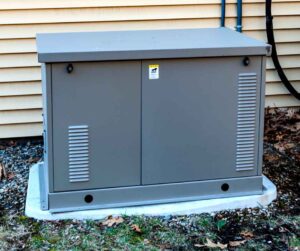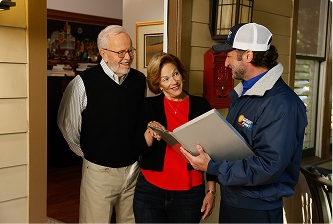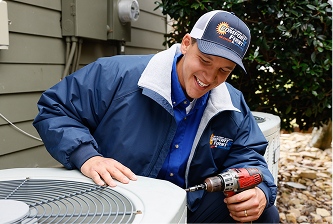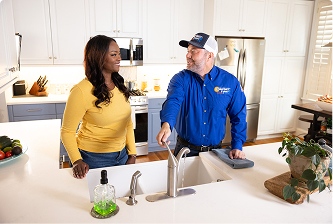When a storm hits or the grid goes down unexpectedly, the last thing you want to worry about is losing power to your most important systems. From your refrigerator and heating unit to lights and medical equipment, reliable backup power keeps your home safe and your family comfortable. But not all generators are created equal, and size matters more than most homeowners realize.
Choosing the right generator size ensures that your backup system can handle your power demands without overloading or wasting energy. A generator that’s too small may fail when you need it most, while one that’s too large can drive up costs and run inefficiently.
That’s where expert guidance makes all the difference. Comfort First Heating & Cooling specializes in helping homeowners select and install perfectly sized generators tailored to their specific needs. With professional sizing, you’ll have confidence that your home will stay powered, efficient, and safe during any outage.
Why Generator Sizing Matters
Choosing the right generator size isn’t just about convenience; it’s also about safety, performance, and long-term reliability. Your generator is the heart of your home’s backup power plan, and sizing it correctly ensures every system you rely on stays functional when the grid goes down.
The Risks of an Undersized Generator
If a generator is too small for your home’s energy demands, it can quickly overload. This not only causes the generator to shut down, but it can also damage sensitive appliances, reduce efficiency, and shorten the lifespan of your unit. During a storm or emergency, that’s the last thing you want to happen.
The Downsides of an Oversized Generator
While it might seem safer to buy a larger model “just in case,” oversizing leads to wasted fuel, higher costs, and unnecessary wear. Generators perform best when they operate within their intended load range. A unit that’s too large will cycle inefficiently and require more maintenance over time.
Balanced Power for Safety and Efficiency
A properly sized generator delivers stable, efficient power to your home’s essential systems, keeping your lights on, your HVAC system running, and your refrigerator cold without interruption. When matched correctly, your generator operates smoothly and safely, saving you money on fuel and reducing stress on your electrical system.

How to Determine Your Home’s Power Needs
Before you can choose the right generator, you need to understand exactly how much power your home uses. Every appliance, system, and light contributes to your total electrical load. Taking the time to calculate your needs helps you avoid costly mistakes and ensures your generator delivers dependable, efficient power.
List Essential Appliances
Start by identifying which appliances and systems you’ll want to run during an outage. Most homeowners prioritize essentials like the refrigerator, HVAC system, water heater, lights, sump pump, and home office equipment. Think about your comfort and safety: what do you need to maintain normal daily life until power is restored?
Calculate Total Wattage
Each appliance uses a specific number of watts. To find your total, look at the manufacturer’s label on each item and note both the starting watts (needed to turn it on) and running watts (needed to keep it operating). Add up the total wattage for all the appliances you plan to use at once. Remember, starting watts are higher, so build in a buffer to prevent overloading.
Plan for Both Comfort and Efficiency
You don’t need to power your entire home to stay comfortable. Focus on keeping essential systems running while maintaining energy efficiency. If you anticipate adding new appliances, home additions, or upgraded HVAC systems in the future, factor that into your generator size so it’s ready to handle your long-term needs.
Use a Professional Load Calculation
For precise sizing, a professional load calculation is the best approach. Comfort First Heating & Cooling uses industry-standard methods and software to measure your home’s electrical demands accurately. This ensures your generator is powerful enough for your needs, without wasting energy or overspending.
Common Generator Sizes and What They Power
Generators come in a wide range of sizes and capacities, from small portable units to powerful whole-home systems. Understanding what each size can handle helps you choose the right model for your needs and avoid overspending on unnecessary capacity.
Small Portable Generators (2,000–5,000 Watts)
Portable generators in this range are great for powering a few essentials during short outages. They can typically handle a refrigerator, a few lights, a TV, or a small space heater. These compact models are affordable, easy to move, and ideal for smaller homes, cabins, or temporary power needs.
Medium Generators (7,000–12,000 Watts)
Mid-range generators are a popular choice for many homeowners because they strike a good balance between capacity and cost. They can power multiple large appliances, including your refrigerator, sump pump, HVAC fan, and some lighting circuits. If you want to maintain a comfortable level of normalcy during outages, this size is often sufficient.
Whole-Home Generators (14,000+ Watts)
For full coverage, a whole-home generator is the best solution. These units can handle nearly every appliance in your home, including central heating and cooling systems, water heaters, kitchen appliances, and even electric vehicle chargers. Whole-home generators are permanently installed and connected to your home’s electrical panel, automatically powering your home when the grid goes down.
Choosing What’s Right for You
The right generator size depends on your lifestyle, home size, and energy priorities. A smaller model may be enough for temporary outages, while a whole-home system provides uninterrupted comfort no matter how long the power is out.
Factors That Influence the Right Generator Size
Every home is different, and several factors determine how much backup power you actually need. Understanding these details ensures your generator is neither too small nor too large, and that it runs efficiently whenever you need it.
Home Size and Layout
Larger homes naturally require more energy to power HVAC systems, lighting, and appliances across multiple rooms or levels. Open floor plans with more shared spaces may also impact airflow and energy demand, influencing how much power your generator must supply.
Appliance Efficiency and Load Demand
Modern appliances and HVAC systems are far more energy-efficient than older models. Upgrading to energy-saving equipment can reduce your total wattage needs, allowing for a smaller generator that still provides full coverage. Conversely, older or high-demand appliances may require additional capacity.
Fuel Type (Natural Gas, Propane, or Diesel)
The type of fuel your generator uses affects both its size and performance. Natural gas generators offer convenience and continuous fuel supply, while propane and diesel models may deliver higher power output but require on-site storage. Choosing the right fuel source helps determine which model best fits your home’s setup and energy goals.
Frequency of Power Outages in Your Area
If you live in an area that experiences frequent or extended outages, investing in a larger, more robust system ensures consistent comfort. Homes that rarely lose power can often rely on smaller or mid-range generators for occasional use.
Future Additions or Renovations
If you plan to expand your home, add new appliances, or install an electric vehicle charger, factor these future loads into your generator decision. Sizing slightly above your current needs can save time and money later by avoiding an upgrade.
Power Your Home the Smart Way with Comfort First
Choosing the right generator doesn’t have to be complicated. With expert guidance, you can ensure your home always has the power it needs, without overspending or sacrificing efficiency. The right generator size provides balance, comfort, and peace of mind, keeping your essential systems running smoothly through every storm or outage.
Whether you’re powering a few key appliances or your entire home, Comfort First Heating & Cooling will help you find the perfect fit. Our team of licensed professionals will handle every step, from load assessment to installation and maintenance, so you can rest easy knowing your generator is ready whenever you need it.
Don’t wait until the next storm hits. Contact Comfort First Heating & Cooling today to schedule your generator sizing consultation. We’ll help you choose the ideal system to keep your home safe, comfortable, and fully powered, no matter what comes your way.
Frequently Asked Questions
How do I know what size generator my home needs?
The best way to determine your ideal generator size is through a professional load calculation. This process measures your total electrical usage, including starting and running watts for essential appliances, to ensure your generator provides enough power without wasting energy.
What happens if I buy a generator that’s too small?
An undersized generator may overload when too many devices are connected, leading to power failures or even equipment damage. It can also shorten the lifespan of both the generator and your appliances. Always match generator capacity to your household’s energy needs for safe, reliable operation.
Can a generator power my HVAC system?
Yes, if it’s sized correctly. Whole-home generators and some medium-capacity models can handle central heating and cooling systems, but the exact requirements depend on your unit’s size and type. Comfort First Heating & Cooling can assess your system and recommend the right generator to manage both comfort and safety.
How long does a whole-home generator last?
With proper maintenance, a high-quality standby generator can last 15 to 20 years or longer. Routine service, such as oil changes, filter replacements, and system testing, ensures it’s ready for use when you need it most.
Do I need a professional to install my generator?
Absolutely. Generator installation involves complex electrical connections, transfer switch wiring, and local code compliance. Hiring a licensed professional ensures safe operation, protects your home’s electrical system, and keeps your warranty valid.



















